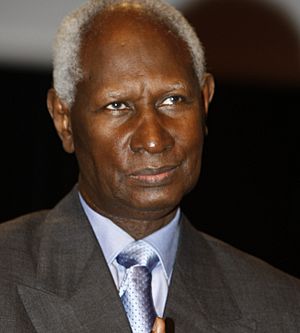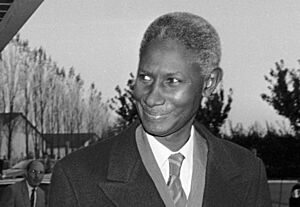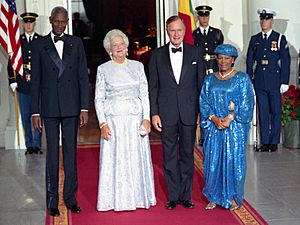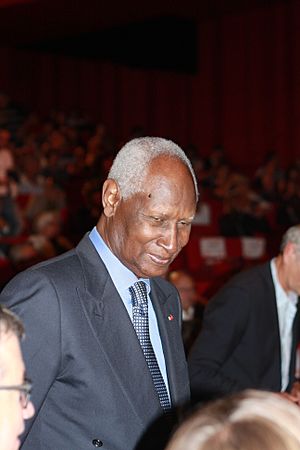Abdou Diouf facts for kids
Quick facts for kids
Abdou Diouf
|
|
|---|---|
|
Abdu Juuf
|
|

Diouf in 2008
|
|
| 2nd Secretary-General of the Organisation internationale de la Francophonie | |
| In office 1 January 2003 – 31 December 2014 |
|
| Preceded by | Boutros Boutros-Ghali |
| Succeeded by | Michaëlle Jean |
| 2nd President of Senegal | |
| In office 1 January 1981 – 1 April 2000 |
|
| Prime Minister |
|
| Preceded by | Léopold Sédar Senghor |
| Succeeded by | Abdoulaye Wade |
| President of Senegambia | |
| In office 12 December 1981 – 30 September 1989 |
|
| Vice President | Dawda Jawara |
| Preceded by | Office established |
| Succeeded by | Office abolished |
| 2nd Prime Minister of Senegal | |
| In office 26 February 1970 – 31 December 1980 |
|
| President | Léopold Sédar Senghor |
| Preceded by | Mamadou Dia (1962) |
| Succeeded by | Habib Thiam |
| Personal details | |
| Born | 7 September 1935 Louga, French West Africa (now Senegal) |
| Political party | Socialist Party |
| Spouse | Elizabeth Diouf |
| Alma mater | University of Dakar Pantheon-Sorbonne University |
Abdou Diouf (born 7 September 1935) is a Senegalese politician. He was the second president of Senegal from 1981 to 2000.
Diouf is known for becoming president peacefully and for leaving office willingly after losing the 2000 presidential election. He lost to Abdoulaye Wade, who had been an opposition leader for a long time. Diouf also served as the second Secretary-General of the Organisation internationale de la Francophonie from January 2003 to December 2014. This organization promotes the French language and cooperation among French-speaking countries.
Contents
Early Life and Education
Abdou Diouf was born in Louga, Senegal. His mother was from the Toucouleur people and his father was from the Serer people. He went to primary and secondary school in Saint-Louis.
He later studied law at Dakar University in Senegal and then at the Sorbonne in Paris, France. Diouf finished his studies and graduated in 1959.
Starting a Political Career
After graduating, Diouf returned to Senegal. In September 1960, he became the Director of International Technical Cooperation. He then held several important government roles.
In 1961, he joined the Senegalese Progressive Union (UPS), which later became known as the Socialist Party of Senegal. He served as Governor of the Sine-Saloum Region and later worked closely with President Léopold Senghor. In February 1970, he was named Prime Minister of Senegal.
Becoming President of Senegal
In 1970, President Senghor brought back the role of prime minister and chose Diouf for the position. Senghor trusted Diouf, who had good experience in government but did not have his own strong political group. This was important because Senghor's previous prime minister had been accused of trying to take power.
On 1 January 1981, President Senghor stepped down, and Abdou Diouf became the new president of Senegal.
Elections and Political Changes
As president, Diouf continued to make Senegal more politically open, a process Senghor had started. In the 1983 elections, he allowed fourteen opposition parties to run. This was a big change from the four parties Senghor had allowed. Diouf won the election with 83.5 percent of the votes.
In 1985, some opposing parties tried to form a group together, but this was not allowed by the country's constitution. Also in 1985, Abdoulaye Wade, who was Diouf's main political opponent, was briefly arrested after an unauthorized protest.
Elections were held again in February 1988. Diouf won with 72.3 percent of the votes, while Wade received 25.8 percent. Some opposing parties claimed there was cheating in the election. After this, there were some disturbances, and Diouf declared a state of emergency. Wade was detained again until May of that year.
Senegambia Confederation
Under President Diouf, Senegal agreed to form a union with its neighbor, Gambia. This union was called Senegambia and began on 1 February 1982.
However, in April 1989, a conflict known as the Mauritania-Senegal Border War started. This led to violence between ethnic groups and Senegal ending its diplomatic ties with Mauritania. As the region became unstable, the Senegambia union was ended.
Fighting AIDS in Senegal
In 1986, President Diouf started an important program to fight AIDS in Senegal. He did this before the virus became widespread in the country. He used the media and schools to teach people about safe practices. He also encouraged community groups and religious leaders, both Christian and Muslim, to help raise awareness about AIDS.
Because of these efforts, while AIDS was a major problem in many parts of Africa, the infection rate in Senegal remained low, staying below 2 percent.
Later Elections and Peaceful Transition
Diouf was reelected in February 1993 for a seven-year term. The length of the presidential term had been extended by two years in 1991.
In the first round of the 2000 elections, held on 27 February, Diouf received 41.3% of the votes. His long-time opponent, Abdoulaye Wade, received 30.1%. In the second round on 19 March, Diouf received 41.5% of the votes, while Wade won with 58.5%.
Diouf accepted his defeat and left office peacefully on 1 April 2000. This peaceful transfer of power was one of his most important contributions to peace in Africa. When Diouf left office, Abdoulaye Wade even suggested that Diouf should receive a Nobel Peace Prize for stepping down without violence.
International Work
Abdou Diouf has been involved in international organizations both during and after his time as president. He was the President of the Organization of African Unity (OAU) from 1985 to 1986. During this time, he asked the President of France, François Mitterrand, to support actions against South Africa. In 1992, he was again chosen as President of the OAU for another year. He also helped create the Goree Institute.
After leaving his role as President of Senegal, Diouf was chosen to be the Secretary-General of La Francophonie. This happened on 20 October 2002. He started this new role on 1 January 2003. He was reelected for another four-year term in September 2006.
Diouf is also a respected member of the Sergio Vieira de Mello Foundation. He is part of the honor committee for the Fondation Chirac, which works to promote world peace. He is also on the International Advisory Board for IMPACT, an organization that fights cyber threats. Additionally, he is one of the 25 important figures on the Information and Democracy Commission, started by Reporters Without Borders.
Awards and Honors
Abdou Diouf has received many awards and honors from different countries and organizations for his service.
| Ribbon bar | Country | Honour |
|---|---|---|
| Senegal | Grand Cross of the National Order of the Lion | |
| Senegal | Grand Cross of the National Order of Merit | |
| France | Grand Cross of the Legion of Honour | |
| Canada | Grand officier of the National Order of Quebec | |
| DR Congo | Grand Cordon of the Order of the National Heroes Kabila-Lumumba | |
| DR Congo | Grand Cordon of the National Order of the Leopard | |
| Organisation internationale de la Francophonie | Grand Cross of the Order of La Pléiade | |
| United Kingdom | Honorary Knight Commander of the Order of the British Empire | |
| South Africa | Grand Cross of the Order of Good Hope | |
| Austria | Grand Star of the Decoration of Honour for Services to the Republic of Austria | |
| Portugal | Grand Cross of the Military Order of Saint James of the Sword | |
| Libya | Grand Cordon of the Order of the Grand Conqueror |
See also
 In Spanish: Abdou Diouf para niños
In Spanish: Abdou Diouf para niños
 | Kyle Baker |
 | Joseph Yoakum |
 | Laura Wheeler Waring |
 | Henry Ossawa Tanner |




